How Do NFT Marketplaces Make Money (08 Ways to Generate Money)
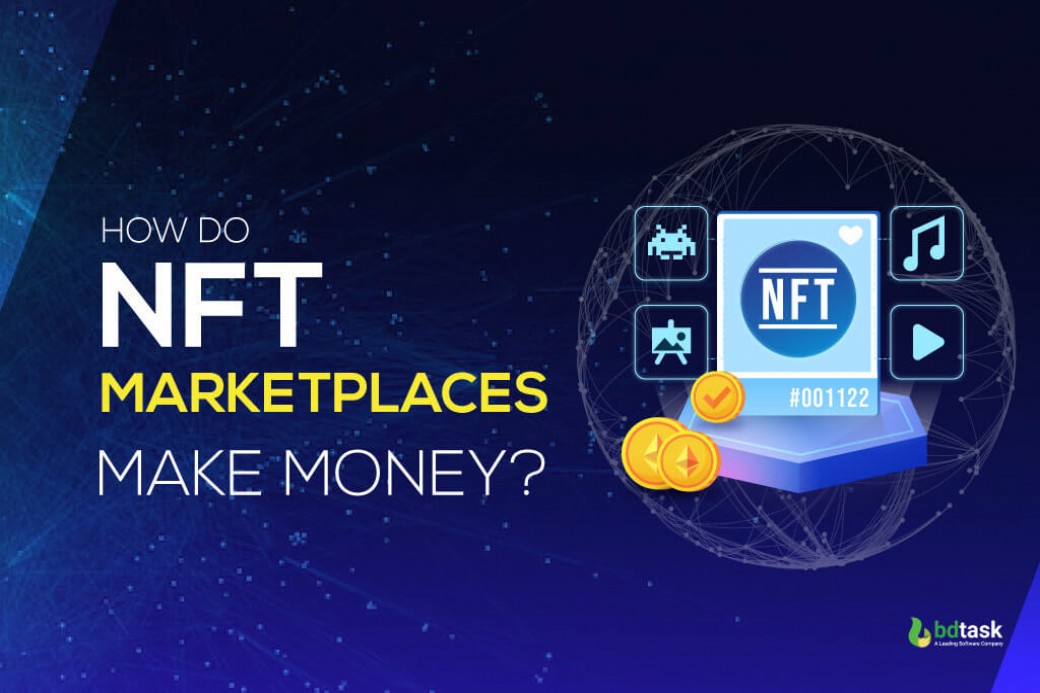
How do NFT marketplaces make money is the first question that comes to mind when one plans to build an NFT platform. NFT marketplaces are the trending marketplace as NFT(non-fungible token) business is growing daily. The NFT market has had exponential marketing growth since its invention in 2015. People love to explore NFT marketplaces for buying and selling NFTs. The excitement is increasing every day for digital collectibles holds.
You may know how collectors and creators make massive money through non-fungible tokens. But do you know how an NFT marketplace owner can make money? Don’t worry. In this article, I will explain how an NFT marketplace works, how exactly NFT marketplaces make money, and how to create an NFT marketplace.
Is NFT actually profitable?
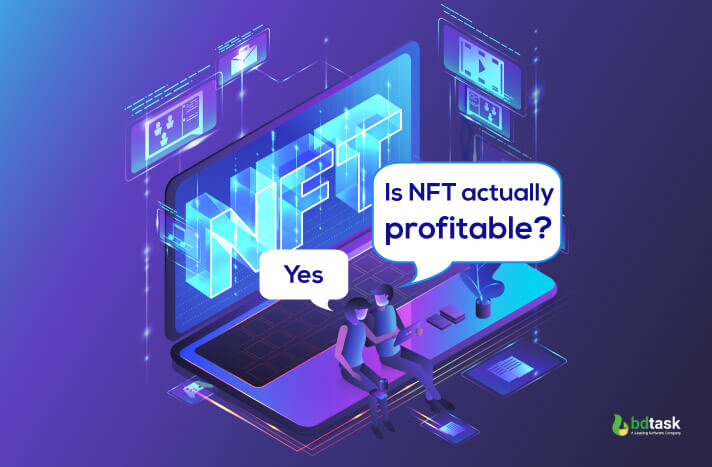
Yes, non-fungible token is actually profitable for digital asset creators and collectors. Artists sell NFTs and make money for their creativity. Investors buy and sell NFTs like stocks in the share market and make a profit too.
According to a recent survey by Statista, around 60,000 NFTs sale daily only on the Ethereum blockchain. However, there are many other blockchain-based NFT platforms too. So, you can easily guess the selling rate of NFTs.
What is an NFT marketplace?
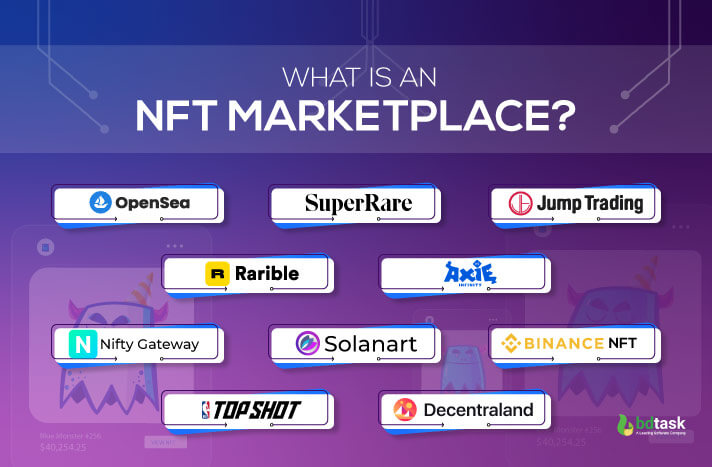
An NFT marketplace is a decentralized digital platform where people can store and display their NFTs for trade. Generally, cryptocurrency is used for this trade. Most NFT marketplaces support minting based on their built-in blockchain.
The majority of the NFT marketplaces use open-source blockchain Ethereum. However, other decentralized blockchains are also used to build the marketplaces.
Some mentionable NFT marketplaces are OpenSea, Rarible, Nifty Gateway, Zora, SuperRare, Foundation, Nifty Gateway, Zora, AtomicMarket, Myth Market, Async Art, BakerySwap, KnownOrigin, etc.
How does an NFT marketplace work?
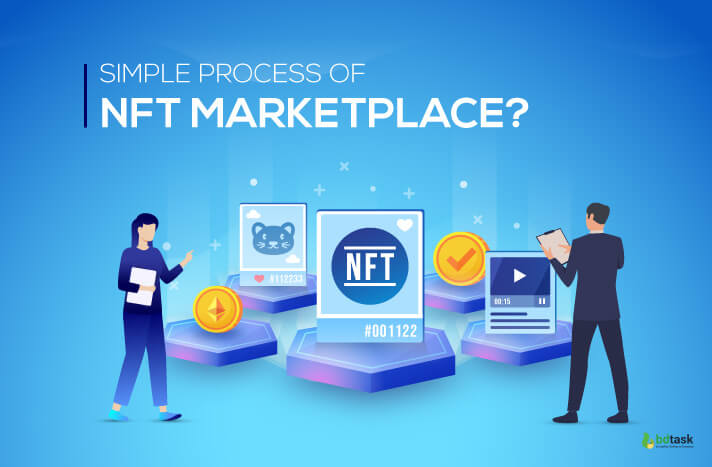
NFT marketplaces are helping artists gain a good income by connecting their unique art with blockchain technology. However, before knowing how NFT marketplaces make money, it is crucial to understand how this marketplace work.
This marketplaces offer artists to sell their work directly to the collectors in the form of NFTs and also give share profit.
Usually, all NFT platforms are built of the same module.
A user has to create an account on the NFT platform using a crypto wallet. Next, the artist uploads their digital asset like video, images, and gifs to the marketplace for minting. After that, an admin approves the NFT for a categorized listing.
Users can sell the NFT buy using an auction or fixed price.
Basically, these non-fungible token platforms remove the middleman between artists and buyers.
How to create an NFT marketplace?
If you have a business plan for the NFT platform business then you have to create an marketplace of your own. You can create an NFT marketplace in 2 ways:
- Build NFT marketplace from scratch
- Use premade Script and customize
1. Build NFT marketplace from Scratch
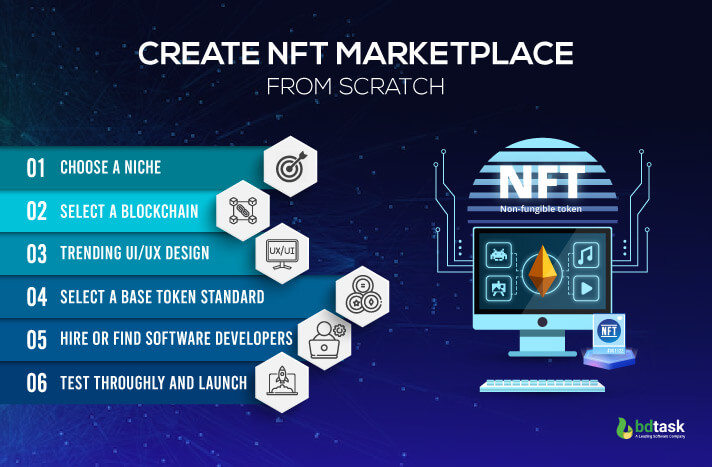
Here are the most common steps for creating an NFT marketplace from Scratch -
i) Choose a Niche
It is better to work on a single NFT theme if you start the NFT business in 2025. You can identify a growing niche or think of a broader audience with less competition. For example, it can be the digital art of celebrities, comic characters, game characters, space, or pixel art.
A well-defined audience will help you create your own room in the NFT business.
ii) Select a Blockchain
Select a blockchain that is right for you. Ethereum is the most used blockchain for the NFT marketplace. Other popular blockchain networks for the NFT marketplace are Avalanche (AVAX), Algorand, Binance Smart Chain (BNB), Cardano, Flow, Solana, Tezos, WAX, etc. Choose one of the well-known blockchains to make your platform secure.
iii) Trending UI/UX Design
Now, choose a trending and eye catchy UI UX design for this marketplace. You can hire a software development company for the front-end and back-end development to ease the task. You can even create a mobile app for the NFT platform so that buyers and sellers can get access quickly.
The NFT business website should be mobile responsive as most internet users are now using mobile or tablets.
iv) Select a Base Token Standard
Then, select a base token standard for NFT. Most popular MNFT marketplaces use Ethereum token standards, and the common token standard is "Ethereum Request for Comment ( ERC)." Some mentionable ERC token standards include ERC 1155, ERC-777, ERC-721, and ERC-20.
Other token standards for blockchains include FA2, dGoods, BEP-2, BEP-20, TRC-20, TRC 721, and CW-20.
Different token standards have different pros and cons. Discuss with your software development team to select the most suitable one for you.
v) Hire or Find Software Developers
Now, you need smart contract development for your decentralized NFT markets. Smart contracts ensure interrupt-free transactions for NFTs trade.
vi) Test Thoroughly and Launch
The final stage is test and deployment. At this stage, you need to identify and resolve every backlog software test before the final launch to ensure that the project works correctly.
Now create a marketing strategy for the pre-launch and post-launch of your brand new NFT market platform.
2. Use premade Script and customize
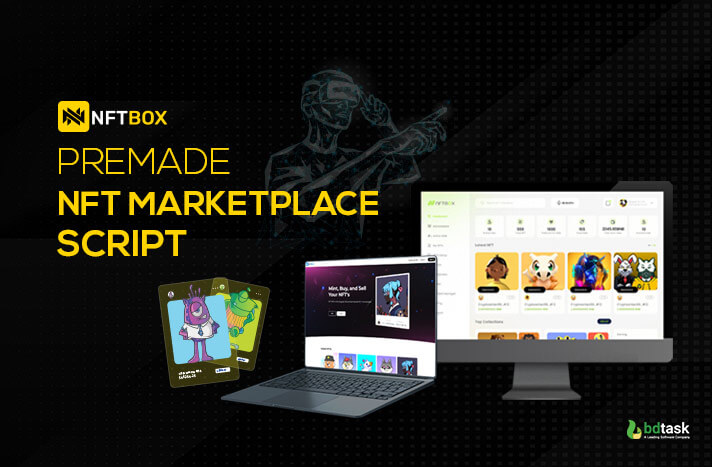
Making an non-fungible token marketplace is easy when you have a premade script. But many cloned scripts in the market do not have enough security and stability. So, you must find the right one that aligns with your needs. Then, buy Script from an authentic source to get high-quality support whenever needed.
NFTBOX is one of the best NFT scripts for people who do not want coding hassle. You can use this Script and immediately start your NFT business. Moreover, you will get a lifetime update for your one-time NFTBOX purchase.
It would be best if you had good hosting that can handle many visitors simultaneously and a perfect domain name that creates an excellent first impression of your NFT business.
What do I need to buy an NFT marketplace Script?
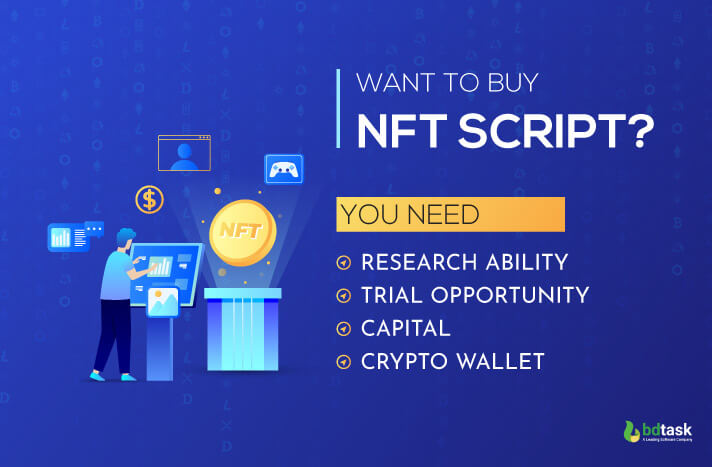
Taking a buying decision is challenging when it involves business. If you want to buy an NFT marketplace Script, you will need the things below to consider and have.
Research Ability
It's always necessary to do research before buying anything, and if the case is NFT, you should be more careful. Watch youtube, Facebook, Twitter, or Linkedin profiles of the NFT script provider company. Find them on major software review websites. Observe what others say about that premade Script or the software development company you are hiring to develop your marketplace.
There is a lot of nulled or clone script out there. But, they may hamper your cyber security. So, buy from authentic sources where real people reviews exist.
Trial Opportunity
NFT is a high-priced product with enormous business investment, so you should ask for trial usage. Use every function of the NFT marketplace script.
You can go for that Script if the admin and general user browsing experience feels good and has customization opportunities.
Capital
Before investing in the NFT marketplace script, you should calculate your total money. If your investment is risky, ignore buying an NFT script for business. Because the maintenance, marketing, and other further tasks may increase your cost.
Crypto Wallet
You need a crypto wallet (Metamask, Coinbase Wallet, Trust Wallet, etc.) to start your own NFT platform business. (Metamask, Coinbase Wallet, Trust Wallet, etc.) Metamask is the most popular one. You can create an account on it or use any other popular wallet for all your crypto transactions for NFT.
How much does it cost to build an NFT marketplace?
The cost of creating an non-fungible token marketplace varies for many factors. For example, the price will increase if you want to make both website and a mobile app. Moreover, for the mobile app, you may need to hire different teams for the iOS and Android versions of the NFT marketplace app.
Here are some factors you can consider primarily for creating an NFT marketplace-
- Software development company you hire
- UI/UX design
- Various third-party API integration cost
- Framework for web development
If you buy a premade script like NFTBOX, this will cost you significantly less than developing a new one. For example, for one license of NFTBOX, you have to pay only 399 USD. But building an NFT script from scratch may cost 30,000USD to 200,000USD. So actually, your NFT script's development cost depends primarily on your country's software developer's salary.
It takes 1-2 days only to start an NFT marketplace if you use a premade NFT marketplace script. Otherwise, NFT marketplace development usually takes at least 4 to 6 months.
How do NFT marketplaces make money (Best 08 ways)
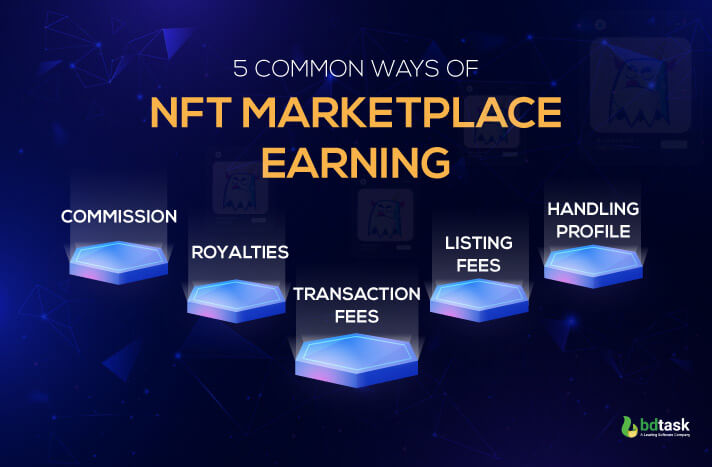
NFT marketplaces make money in many ways. Different marketplaces have different strategies to make money. Here are some of the mentionable ways of making money from NFT marketplaces that most popular marketplaces follow.
01. Transaction Fees
All the NFT marketplaces earn revenue from transaction fees.
Most marketplaces charge buyers. This is the primary earning way of NFT marketplaces.
They charge 2 to 5 percent per transaction. For example, OpenSea charges 2.5 percent of buying fees as transaction fees.
02. Listing Fees
Artists have to pay Gas fees along with a transaction for minting NFT. This is the way marketplace owners earn money from artists. Most NFT platforms charge for listing, minting, or removing NFT from the list.
Gas fees depend on the demand and time of the transaction in the blockchain. You can check the latest Gas fees of Etherium blockchain from Etherscan.
03. Royalties
Many marketplaces earn money from Royalties. The original artist gets a percentage when secondary buyers resale their NFTs. And marketplaces also get a portion of the profit from the sale. Mintable and Nifty Gateway are some of the marketplaces.
04. Commission
Some marketplaces get commissions from sellers. SuperRare is such a website to collect commissions for earning. They take 15 percent from sellers from the first sale, but from the secondary sale, they give the original artist 10 percent and 90 percent to resellers.
05. Handling Profile
Most of the creators focus on their arts, music, or video. Therefore, they do not want the hassle of managing the NFT business. That is why they depend on featureful marketplaces to ease technical work.
These marketplaces do marketing for NFTs and take a significant sale percentage.
So, NFT marketplaces make money primarily by transaction fees, royalties, and commission fees. Every NFT market has its own policies for business.
Check the terms, conditions, and Policies to understand better how NFT marketplaces make money by creating a platform for buying, selling, and minting digital assets.
06. Upgradable Offerings
Marketplaces can generate additional revenue by providing additional value to users through premium offerings. People love to have premium features like priority listing, highlighted content, early access, discounted price and premium forum access.
Various types of users have various demands from an NFT marketplace. You can earn a lot of money from your NFT project by offering new features and customised services. This offer will also help you grow your users and encourage them to spend more money on your platform.
07. Collaborations
NFT marketplaces can also generate revenue through collaborations. You can partner with artists, photographers, brands, celebrities, or organisations to launch and promote exclusive NFT collections.
You can share the revenue so that your marketplace can take a portion of sales from collaboration. Partners can share each other’s platform to share their users to generate more revenue.
08. Advertisements
Another good way to earn an extra benefit is by placing sponsor ads on your NFT marketplace website. You can charge different amount of fees for different ad placements and media types.
If you have enough visitors on your NFT platform, you can also apply for a reputed ad publisher site like Google AdSense and earn money without sponsor hassle.
Conclusion
Now you know the necessary NFT business functionalities - especially the potentiality of this business, how to create an NFT marketplace, and you also get an answer for how does an NFT marketplace earn money.
NFT marketplaces are increasing and making history with record-breaking revenue. So, there is an excellent chance that the NFT business will be an incredible business journey if you get all the necessary support and knowledge to build one. Hope this article will help you develop and launch your first NFT marketplace. And you will also be able to make money from your NFT marketplaces using the mentioned ways in the article.
Frequently Asked Questions (FAQs)
1. How do NFT marketplaces mainly make money?
- NFT marketplaces mainly make money by charging different types of fees, mainly for listing and selling NFTs.
2. What are the top fees that NFT marketplaces charge?
- NFT marketplaces typically charge the following fees - Listing fees, Selling fees, Transaction fees, Minting fees, and Management fees.
3. How much do NFT marketplaces charge in fees?
- The fees charged by NFT marketplaces vary depending on the marketplace. However, most popular NFT marketplaces charge between 2% and 5% in fees.
4. Are there any other ways that NFT marketplaces make money?
- Yes, there are other ways that NFT marketplaces make money. For example, some marketplaces may charge for premium listings or features. Some marketplaces may generate revenue from advertising or partnerships.
5. Is it profitable to run an NFT marketplace?
- The profitability of an NFT marketplace will depend on several factors, such as the volume of transactions, the fees charged, and the cost of operations. However, many NFT marketplaces have been successful and generated significant profits. So, you can also make your NFT marketplace business profitable if you follow a proper business strategy.
Disclaimer: All the data used in this article is for informational purposes only and is not investment advice. The information in this article may vary due to changes in the sources. We have tried to put the most reliable information.










